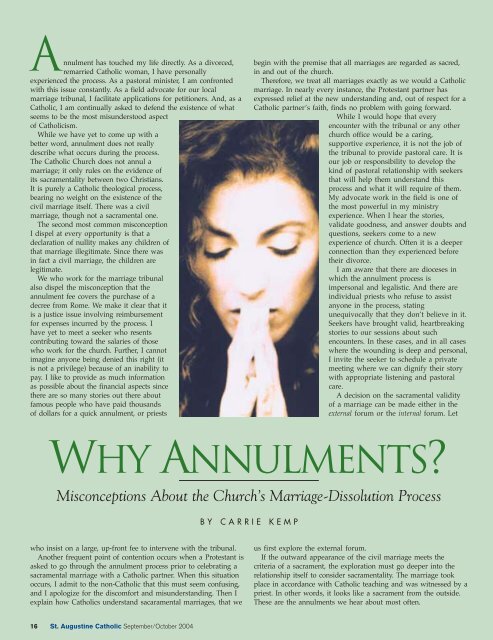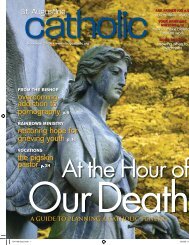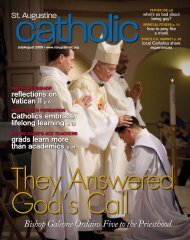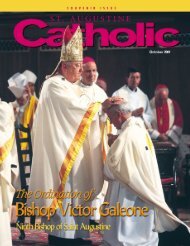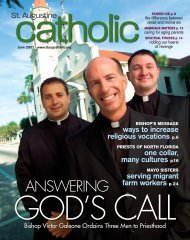A Pastoral Letter By Bishop Galeone A Pastoral Letter By Bishop ...
A Pastoral Letter By Bishop Galeone A Pastoral Letter By Bishop ...
A Pastoral Letter By Bishop Galeone A Pastoral Letter By Bishop ...
You also want an ePaper? Increase the reach of your titles
YUMPU automatically turns print PDFs into web optimized ePapers that Google loves.
Annulment has touched my life directly. As a divorced,<br />
remarried Catholic woman, I have personally<br />
experienced the process. As a pastoral minister, I am confronted<br />
with this issue constantly. As a field advocate for our local<br />
marriage tribunal, I facilitate applications for petitioners. And, as a<br />
Catholic, I am continually asked to defend the existence of what<br />
seems to be the most misunderstood aspect<br />
of Catholicism.<br />
While we have yet to come up with a<br />
better word, annulment does not really<br />
describe what occurs during the process.<br />
The Catholic Church does not annul a<br />
marriage; it only rules on the evidence of<br />
its sacramentality between two Christians.<br />
It is purely a Catholic theological process,<br />
bearing no weight on the existence of the<br />
civil marriage itself. There was a civil<br />
marriage, though not a sacramental one.<br />
The second most common misconception<br />
I dispel at every opportunity is that a<br />
declaration of nullity makes any children of<br />
that marriage illegitimate. Since there was<br />
in fact a civil marriage, the children are<br />
legitimate.<br />
We who work for the marriage tribunal<br />
also dispel the misconception that the<br />
annulment fee covers the purchase of a<br />
decree from Rome. We make it clear that it<br />
is a justice issue involving reimbursement<br />
for expenses incurred by the process. I<br />
have yet to meet a seeker who resents<br />
contributing toward the salaries of those<br />
who work for the church. Further, I cannot<br />
imagine anyone being denied this right (it<br />
is not a privilege) because of an inability to<br />
pay. I like to provide as much information<br />
as possible about the financial aspects since<br />
there are so many stories out there about<br />
famous people who have paid thousands<br />
of dollars for a quick annulment, or priests<br />
begin with the premise that all marriages are regarded as sacred,<br />
in and out of the church.<br />
Therefore, we treat all marriages exactly as we would a Catholic<br />
marriage. In nearly every instance, the Protestant partner has<br />
expressed relief at the new understanding and, out of respect for a<br />
Catholic partner’s faith, finds no problem with going forward.<br />
While I would hope that every<br />
encounter with the tribunal or any other<br />
church office would be a caring,<br />
supportive experience, it is not the job of<br />
the tribunal to provide pastoral care. It is<br />
our job or responsibility to develop the<br />
kind of pastoral relationship with seekers<br />
that will help them understand this<br />
process and what it will require of them.<br />
My advocate work in the field is one of<br />
the most powerful in my ministry<br />
experience. When I hear the stories,<br />
validate goodness, and answer doubts and<br />
questions, seekers come to a new<br />
experience of church. Often it is a deeper<br />
connection than they experienced before<br />
their divorce.<br />
I am aware that there are dioceses in<br />
which the annulment process is<br />
impersonal and legalistic. And there are<br />
individual priests who refuse to assist<br />
anyone in the process, stating<br />
unequivocally that they don’t believe in it.<br />
Seekers have brought valid, heartbreaking<br />
stories to our sessions about such<br />
encounters. In these cases, and in all cases<br />
where the wounding is deep and personal,<br />
I invite the seeker to schedule a private<br />
meeting where we can dignify their story<br />
with appropriate listening and pastoral<br />
care.<br />
Adecision on the sacramental validity<br />
of a marriage can be made either in the<br />
external forum or the internal forum. Let<br />
WHY ANNULMENTS?<br />
Misconceptions About the Church’s Marriage-Dissolution Process<br />
BY CARRIE KEMP<br />
who insist on a large, up-front fee to intervene with the tribunal.<br />
Another frequent point of contention occurs when a Protestant is<br />
asked to go through the annulment process prior to celebrating a<br />
sacramental marriage with a Catholic partner. When this situation<br />
occurs, I admit to the non-Catholic that this must seem confusing,<br />
and I apologize for the discomfort and misunderstanding. Then I<br />
explain how Catholics understand sacaramental marriages, that we<br />
us first explore the external forum.<br />
If the outward appearance of the civil marriage meets the<br />
criteria of a sacrament, the exploration must go deeper into the<br />
relationship itself to consider sacramentality. The marriage took<br />
place in accordance with Catholic teaching and was witnessed by a<br />
priest. In other words, it looks like a sacrament from the outside.<br />
These are the annulments we hear about most often.<br />
16 St. Augustine Catholic September/October 2004


